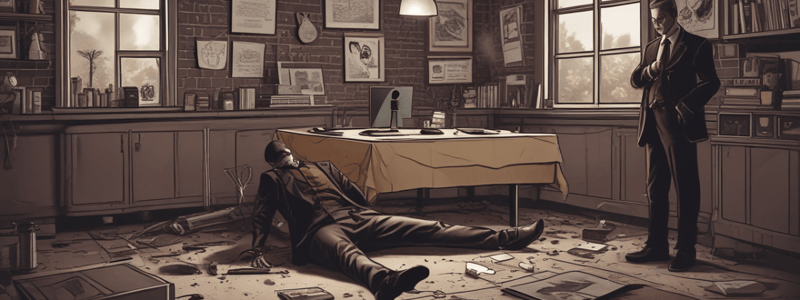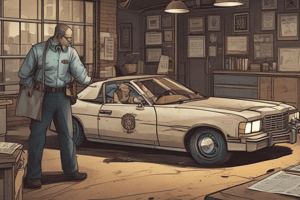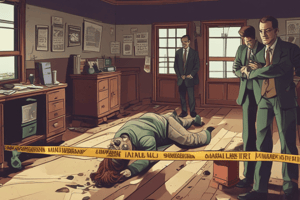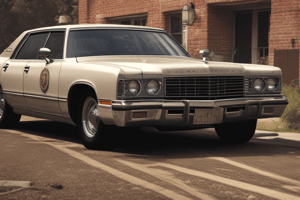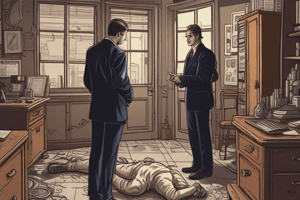Podcast
Questions and Answers
What is the primary objective of a criminal investigation?
What is the primary objective of a criminal investigation?
- To conduct a preliminary investigation
- To determine the time of death
- To achieve additional objectives set by the Training Center
- To identify the deceased and determine the cause and manner of death (correct)
What is the composition of a Jury of Inquest?
What is the composition of a Jury of Inquest?
- Six of the deceased's peers (correct)
- Six medical experts
- Six law enforcement officials
- Six forensic pathologists
What is the predecessor to the forensic pathology system?
What is the predecessor to the forensic pathology system?
- The coroner system (correct)
- The Training Center
- The crime scene investigation section
- The Jury of Inquest
What is the meaning of the Latin word 'corona'?
What is the meaning of the Latin word 'corona'?
What is a limitation of the Jury of Inquest system?
What is a limitation of the Jury of Inquest system?
What is the motivation for the development of forensic pathology?
What is the motivation for the development of forensic pathology?
What is a key difference between a coroner and a medical examiner?
What is a key difference between a coroner and a medical examiner?
What is the primary role of a medico-legal death investigator?
What is the primary role of a medico-legal death investigator?
What type of death is characterized by homicides, suicides, and traffic accident fatalities?
What type of death is characterized by homicides, suicides, and traffic accident fatalities?
What is the purpose of a forensic pathologist?
What is the purpose of a forensic pathologist?
What is the difference between cause of death and manner of death?
What is the difference between cause of death and manner of death?
What is the purpose of a forensic illustrator?
What is the purpose of a forensic illustrator?
What is the primary role of a forensic toxicologist?
What is the primary role of a forensic toxicologist?
What is the purpose of a forensic anthropologist?
What is the purpose of a forensic anthropologist?
What is the purpose of a forensic psychologist?
What is the purpose of a forensic psychologist?
What is the purpose of the 'open' verdict?
What is the purpose of the 'open' verdict?
Study Notes
Crime Scene Investigation
- The primary objectives of a criminal investigation are to identify the deceased, determine the cause and manner of death, and pinpoint the time of death.
Investigative Issues
- Identification of deceased: who is dead?
- Cause of death: what did the person die of?
- Manner of death: how did the person die?
- Time of death: when did the person die?
- Circumstances of death: why did the person die?
History of Death Investigation
- The term "coroner" comes from the Latin word "corona", meaning "crown".
- A coroner's jury of inquest determines the cause and manner of death.
- Forensic pathology combines law and medicine to investigate deaths.
Coroner vs. Medical Examiner Systems
- Coroner system: elected official with no specific background requirements, uses a jury of inquest, and has limited powers and a low operating budget.
- Medical Examiner system: appointed/civil service official who must be licensed to practice medicine, does not use a jury of inquest, and has more power and a higher operating budget.
Types of Medical Examiner Cases
- Violent deaths: homicides, suicides, traffic accident fatalities, and accidental deaths.
- Sudden and unexpected deaths: at home, in hospital, or without medical care.
- Environment-related deaths: industry, pesticides, food additives, and natural causes.
- Deaths related to community health and safety: drug abuse, contagious diseases, cremation, and medical care.
Case Routine
- Telephone notification and report to the Medical Examiner's Office.
- Field investigator responds to the scene or hospital and conducts the follow-up investigation.
- Removal of the body to the county morgue for autopsy or external examination.
- Toxicology and histology tests are conducted.
- Case conference with specialists to discuss the case.
- Chief Medical Examiner determines the cause and manner of death.
Assisting the Medical Examiner
- Medico-legal death investigator: conducts on-scene investigation and reports findings to the Medical Examiner.
- Crime Scene Investigator: a police officer who processes the scene.
- Forensic specialists: forensic photographer, forensic pathologist, forensic toxicologist, forensic odontologist, forensic radiologist, forensic anthropologist, and forensic illustrator.
Manner of Death
- Cause of death: the disease or injury that initiated the lethal sequence of events.
- Manner of death: the fashion in which the cause of death came into being.
- Manner of death classifications: natural causes, homicide, accident, suicide, and undetermined.
Studying That Suits You
Use AI to generate personalized quizzes and flashcards to suit your learning preferences.
Description
This quiz covers the primary objectives of a criminal investigation, procedures for conducting an investigation, and the main objectives and steps taken in a preliminary investigation.
